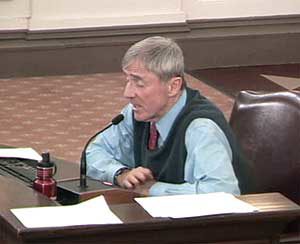
At the Legislative Matters committee meeting last Thursday, Alderman At-Large John Connolly expressed his view that it would be wrong to restrict service on the CBC by municipal employees.
By Jordan Deschenes
After over two months of discussions, Somerville city officials are still in the editing stages of the proposed Community Benefits Committee (CBC) ordinance. Aldermen met last week at a Legislative Matters committee meeting to review two drafts of the document, deliberating the lawfulness and ethical implications of the drafts’ language.
With the assistance of city solicitor Francis Wright, several points were identified that could potentially generate issues. It was also found that a draft submitted by Union United had made changes to a previous version that would violate the legality of reaching a Community Benefits agreement between the developer and the neighborhood council.
“The changes resulted in a manner that would affect the Special Permit Granting Authority’s ability to make a decision as is its function, without the private parties – in this case, the developer and the Neighborhood Council – meeting in good faith to reach a community benefits agreement (CBA). In our opinion, that is a violation of the law,” said Wright.
Wright further explained that the Neighborhood Council’s ability to enter into a binding CBA with a developer was in violation of a 1963 Massachusetts Supreme Court finding, Weld vs. Board of Appeals of Gloucester. According to Wright, the ruling argues that it is unlawful to cede a function of a government entity, specifically the Special Permit Granting Authority, to another lesser entity.
In addition to discussing the CBC ordinance, aldermen also weighed the possibility of establishing a Home Rule Petition to ensure the collection of revenue from developers who will benefit from the Green Line Extension project in Union Square. Despite this proposal, OSPCD and Intergovernmental Affairs Directors Michael Glavin and Tim Snyder both reminded city officials that current agreements with developers have been successful, and there is a plan in place “to ensure greater contributions” than those collected from a Home Rule Petition.
Although city officials have made it clear that the CBC ordinance was not written specifically for the Union Square Revitalization Plan, the two are mutually exclusive with regards to meeting the timeline and funding goals for the comprehensive Union Square Revitalization Plan. Having undergone talks for years, the plan is dependent on the master developer, US2, to enter into a Community Benefits Agreement with the city, the legality of which has also come into question.
Currently, the deadline to negotiate and approve both the Union Square zoning and covenant ordinances has been extended to June 8 from May 31, according to multiple city sources.
Amid discussions surrounding the proposed Union Square Revitalization Plan, city officials have been working carefully to ensure that residents will be fairly represented throughout the process. Aldermen have been adamant in emphasizing that the CBC’s makeup should fairly represent the city’s population.
“Committees such as this tend to lean towards having professionals and people with expertise in particular areas and that’s very important, but it also tends to exclude people who don’t have that who might bring a lot to the committee,” said Ward 5 Alderman Mark Niedergang.
“The way it reads now is that if you aren’t an expert, you’re not qualified. I don’t want to say that…we need to add language that reminds the nominating committee that it doesn’t have to be a professional or expert that they nominate.”
As it is written, CBC members will be designated as uncompensated, “special” municipal employees. Upon questioning from Niedergang, Solicitor Wright explained that the current language in section 1c of the draft ordinance would create an exemption for municipal employees, allowing them to serve on the committee.
Ward 1 Alderman Matthew McLaughlin expressed his concerns about a conflict of interest in permitting city employees onto the committee, citing a recent video that he had seen depicting a vote that took place for the Union Square Advisory Committee. McLaughlin argued that in the video, at least one USAC member abstained from voting because he was a specially designated municipal employee at risk of affecting his job position.
Director Glavin expanded upon the point, raising the question as to whether municipal employees should be allowed to serve on the committee or instead, in direct proportion to non-city employee CBC members.
Despite their concerns, aldermen agreed that the best option for nominating CBC members would be to do so on a case-by-case basis. Solicitor Wright downplayed the threat of a municipal employee having a true conflict of interest in any decisions that would be made by the CBC, citing that any “special” designation would bind an employee to state ethics laws.
“It’s wrong not to allow any member of the community that wants to serve (on the CBC) who might be a crossing guard, a parking enforcement officer, or even a librarian who has a special interest in serving,” said Alderman At-Large John Connolly.
“I want to make certain that we leave this as open as possible and make sure that the CBC nominating committee should look far and wide to get the people who truly want to serve their community, whether they work for the city or not.”












Reader Comments